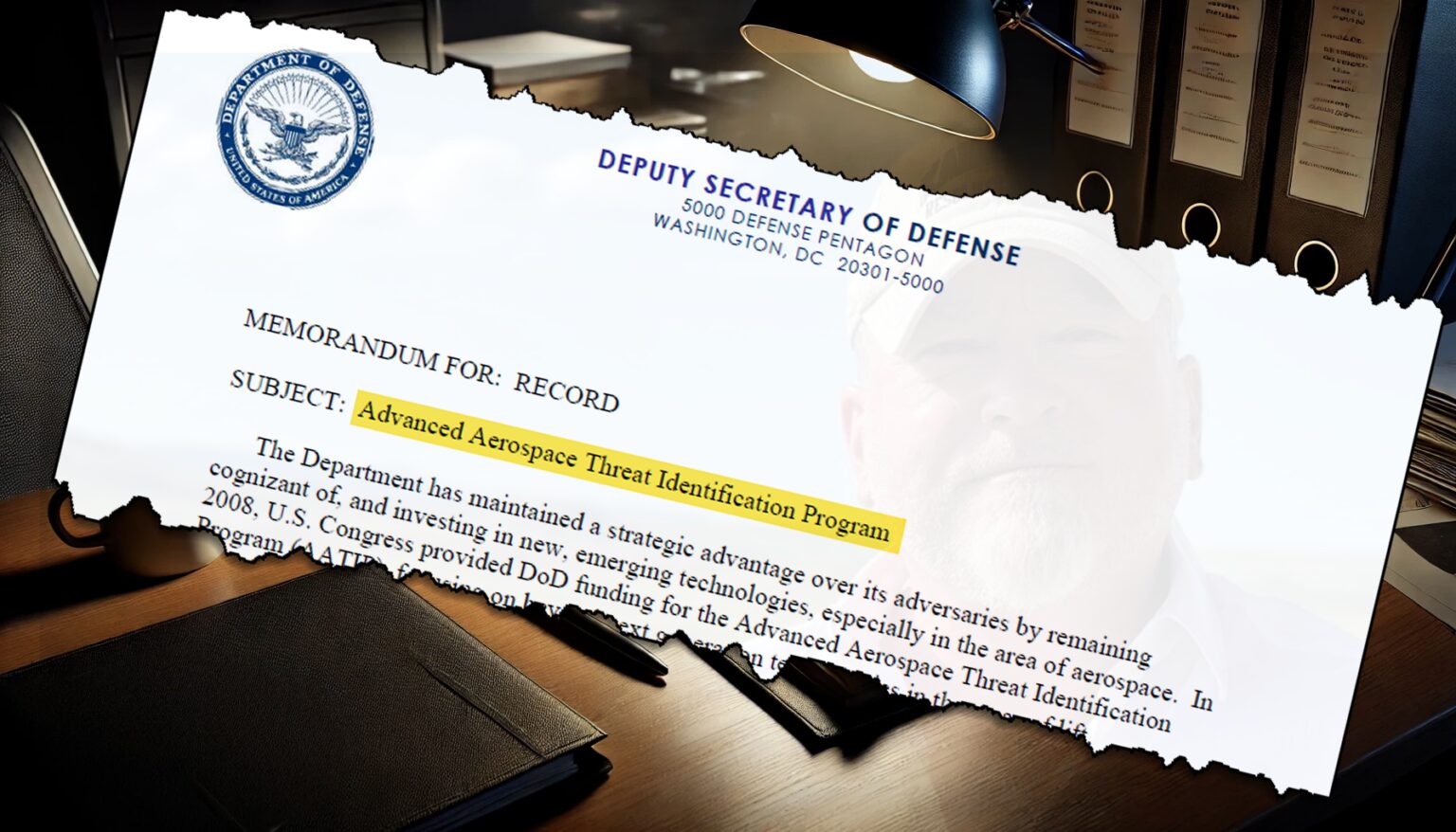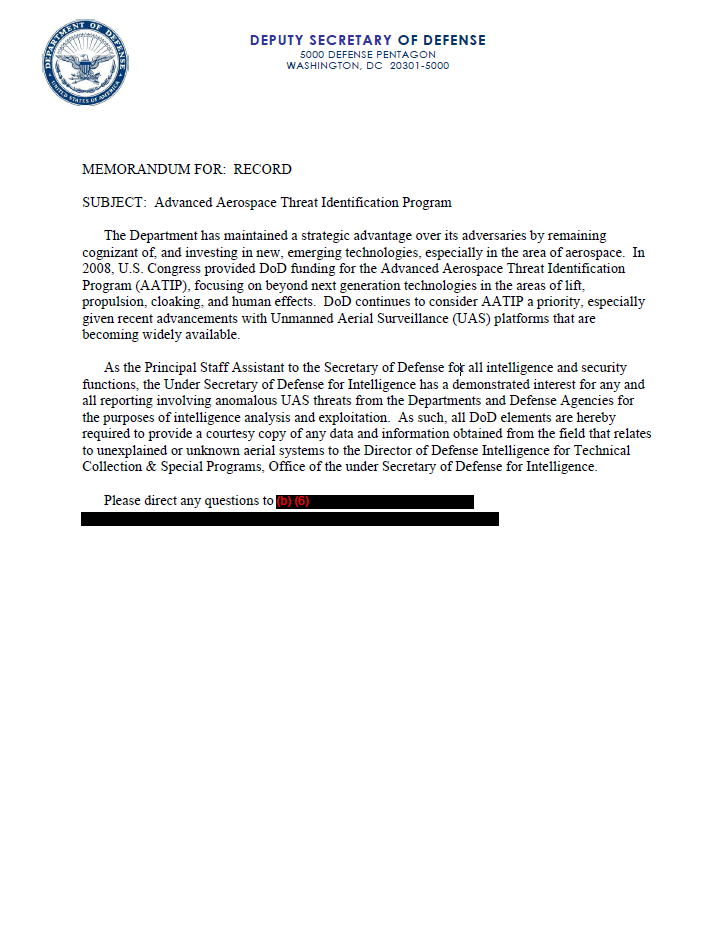Note and Update 8/23/24 @ 4:55p Pacific time: Hours after the publication of this article, the Pentagon responded with comment. The article has been updated to reflect those answers, which are added in BLUE.

After years of bureaucratic obstacles and inconsistent responses, The Black Vault has obtained a highly sought after document through the Freedom of Information Act (FOIA) that directly references the Advanced Aerospace Threat Identification Program (AATIP), reported since 2017 as “The Pentagon’s Secret Search for UFOs“. The draft memo, never-before-seen by the public and authored by former DoD counterintelligence agent Luis Elizondo, details AATIP’s mission as “focusing on beyond next generation technologies in the areas of lift, propulsion, cloaking, and human effects,” and describes how AATIP was gathering information on “unexplained or unknown aerial systems” from various DoD components and elements. But more importantly to some, it may even confirm Elizondo’s official work within the program, a claim denied by the Pentagon since 2019.

The journey to obtain these records began on May 5, 2021, when The Black Vault filed FOIA case 21-F-0964. The request specifically sought communications between Elizondo and Neill Tipton, a senior DoD official that was also one of three named individuals in Elizondo’s DoD Inspector General (IG) complaint filed on May 3, 2021. This complaint alleged that all three (Tipton, Pentagon Spokesperson Susan Gough and former Director for Defense Intelligence [Intelligence and Security] Garry Reid) “conducted retribution and provided false information to the public,” and were also accused by Elizondo of “abusing government authority” and “illegal destruction of information.” This complaint stemmed from Elizondo’s belief that he was being mistreated after his resignation from the Pentagon due to his decision to speak about his time investigating UFOs, now being referred to as Unidentified Anomalous Phenomena (UAP).
After amending the FOIA request to focus only on emails between Elizondo and Tipton containing keywords such as “unidentified,” “AATIP,” and “UAP,” (and others) in response to the DoD’s request to narrow the search scope, the DoD initially replied in December 2021, stating that “no records” were found.
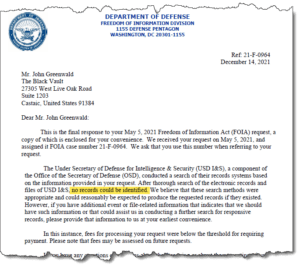
Believing differently, The Black Vault filed an appeal within one day, asserting that responsive documents existed. This assertion was based on knowledge gained from various sources and research means during the timeframe leading up to the case filing. The information learned through this process, combined with the specific keywords provided for the FOIA request along with the date range requested for the search (2008 – 2017), left little to no doubt that responsive records existed.
“September 25, 2017, at 11:23a, Mr. Luis Elizondo sent an e-mail to Mr. Neill Tipton which included the ‘AATIP’ acronym in the body,” the appeal stated. This fact alone should have yielded at least one responsive document to the request, which was used as the basis of the appeal.
The appeal letter filed by The Black Vault went on to further express deep frustration with the FOIA process, the DoD, and their handling of cases related to AATIP and Elizondo, stating:
“Let me add within the body of this appeal, on how frustrating some of these requests are getting. I believe, and hope, your office has seen the lengths I’ve gone to try and make your efforts easier by closing / withdrawing requests, to reduce paperwork etc. I am also always there, when possible, to amend requests to also lessen the burden of a workload. However, as you can see with this case alone (and now many others), cases are having me reduce the scope to help, but after months (and sometimes years) of waiting, they are inappropriately closed, and I have to then go through the lengthy appeal process. There are NUMEROUS agencies that I can cite, where requests are processed for communications between two people, without stipulating a keyword search. I am sure a keyword reduction in scope helps, but as we can see here, that is likely creating more problems; generating more paperwork; and wasting more time than it is actually helping.”
The appeal was also cc’d electronically to the Office of Government Information Services (OGIS), which acts as a mediator between FOIA requesters and federal agencies, helping to resolve disputes and ensure proper handling of FOIA requests.
The appeal was ultimately granted in February 2022, and the case was remanded back to the DoD for further processing. Despite this, The Black Vault never received an acknowledgment that the case had been reopened, as required by law. When The Black Vault inquired about the status in August 2023, a year and a half after the case should have been reopened and acknowledged, the DoD responded that an acknowledgment letter had not been sent as it was “overlooked.” Although it was then sent that day, and the case was renumbered as 21-FR-0964 due to the remand, there was no estimated date of completion given.
In a puzzling sequence of events that followed, the documents related to FOIA case 21-FR-0964 were later allegedly released on March 29, 2024. But yet again, The Black Vault never received that correspondence, either, and no explanation was given as to why that was by the writing of this article. The results of that case, once the documents were finally received just this week, in a moment.
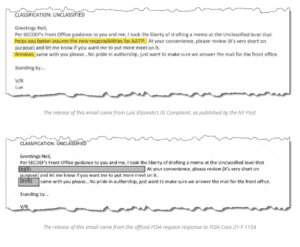
But first, it turned out that the same documents requested in 21-FR-0964 happened to turn up and were released in May 2024 under FOIA case 21-F-1154, but they had extensive redactions. This case was originally filed by The Black Vault in June 2021.
These redactions included the complete blacking out of a crucial memo on AATIP which was attached to one of the emails written by Elizondo that was released in that case. In addition, another reference to AATIP in one of the emails was also mysteriously redacted, even though it had already been published unofficially and was available in the public domain through Elizondo’s IG complaint about 2 years prior and a portion of the same referenced in Popular Mechanics another 2 years prior to that.
These actions further complicated the DoD’s already questionable handling of these types of requests. The DoD had claimed FOIA’s “deliberative process” exemption known as (b)(5) to justify the redactions of AATIP related material, despite some of it already being available in the public domain for years. From a legal standpoint, The Black Vault felt none of these actions were justified, and an appeal was filed. As of the writing of this article, that appeal remains open. This was all reported by The Black Vault on May 13, 2024.
Now back to FOIA case 21-FR-0964.
 This week, sparked by the release of Elizondo’s new book Imminent which contains numerous references to Tipton, a follow up was sent by The Black Vault regarding FOIA case 21-FR-0964 to check on the status. Although no explanation was given, the same day the follow up was sent, the FOIA case officer emailed the final FOIA response letter that was dated March 29, 2024, nearly 5 months ago; an email thread between Elizondo and Tipton about “responsibilities for AATIP” being transferred between the two gentlemen which mysteriously had redactions lifted contrary to FOIA case 21-F-1154; and the AATIP memo that The Black Vault was fighting for through appeal on FOIA case 21-F-1154, which now appeared nearly entirely unredacted.
This week, sparked by the release of Elizondo’s new book Imminent which contains numerous references to Tipton, a follow up was sent by The Black Vault regarding FOIA case 21-FR-0964 to check on the status. Although no explanation was given, the same day the follow up was sent, the FOIA case officer emailed the final FOIA response letter that was dated March 29, 2024, nearly 5 months ago; an email thread between Elizondo and Tipton about “responsibilities for AATIP” being transferred between the two gentlemen which mysteriously had redactions lifted contrary to FOIA case 21-F-1154; and the AATIP memo that The Black Vault was fighting for through appeal on FOIA case 21-F-1154, which now appeared nearly entirely unredacted.
The documents, which were first denied by the DoD to even exist three years ago, were now found. As of the writing of this article, no explanation as to either why the DoD never found them, or why they were not truthful in their 2021 response to The Black Vault, has been given.
This AATIP memo, never-before-seen by the public until now, was originally drafted in 2017 by Elizondo in hopes that it would be later issued by then Deputy Secretary of Defense (DepSecDef) Patrick M. Shanahan. It confirms the existence of AATIP and the scope of the program. The memo states that AATIP was a program with a strategic focus on “beyond next generation technologies in the areas of lift, propulsion, cloaking, and human effects,” and sought “unexplained or unknown aerial systems” information from all DoD elements “for the purposes of intelligence analysis and exploitation.”
The memo states that the “DoD continues to consider AATIP a priority, especially given recent advancements with Unmanned Aerial Surveillance (UAS) platforms that are becoming widely available.”
Further to that, it states that OUSDI “has a demonstrated interest for any and all reporting involving anomalous UAS threats” and it goes on to order that “all DoD elements are hereby required to provide a courtesy copy of any data and information obtained from the field that related to unexplained or unknown aerial systems to the Director of Defense Intelligence for Technical Collection and Special Programs.” That position was held by Neill Tipton, and this memorandum, if officially issued by the DepSecDef department-wide, would ultimately make Tipton’s desk the central point of information related to AATIP once information was received from DoD elements.
Although it does not reference “UAP” or “UFOs” specifically, the mention of “unexplained or unknown aerial systems” and “anomalous UAS threats” makes it the first official DoD document of its kind to connect “AATIP” to such a mission investigating “unexplained” objects.
In addition to giving a rundown of AATIP’s scope and mission, the existence of this memo may also directly contradict the DoD’s ongoing assertions that Elizondo had no official role in the program. This has been a claim by the Pentagon that has fueled much controversy that has lasted for years. Could the revelations within the memo have played a role in why the DoD wanted to deny the memo’s existence three years ago? Or, was this truly an administrative oversight, and the documents were simply “overlooked” similar to how the DoD failed to send an acknowledgement letter once the case was remanded back to them that sought it in the first place?
Regardless of why this memo was not discovered and denied to exist in 2021, it likely won’t settle the debate about Elizondo’s claimed leadership of AATIP or the stated objectives of AATIP once and for all.
For some, this memo will absolutely be viewed as a pivotal piece of evidence in the ongoing debate over AATIP’s scope and Elizondo’s involvement. To them, this will serve as undeniable proof, if they even felt undeniable proof wasn’t already out there to begin with.
To others, the release of this may simply be seen as a draft memorandum that was authored by Elizondo, without definitively proving his leadership or directorship of a “funded” “UFO program” known as “AATIP,” and in the end, to them, it will prove nothing.
This juxtaposition is a true testament to the divide between skeptics and believers in today’s conversation about the UFO topic.
But even as early as just days ago, the DoD still continues to deny Elizondo’s official involvement in AATIP — a claim Elizondo still strongly disputes. However, that was prior to the DoD releasing and the public seeing this memorandum. So, The Black Vault reached out to the Pentagon for comment.
“How does this not contradict the DoD’s stance on Luis Elizondo, and the denial of his official responsibilities on AATIP? Why would he be drafting such a memorandum if AATIP had long been cancelled (per DoD), and that he had no official responsibilities on it (per DoD)?”, the first question asked.
After publication of this article, Pentagon spokesperson Susan Gough submitted comment by stating, “Luis Elizondo had no assigned responsibilities for AATIP. As noted in the Historical Record Report Volume 1, available on www.aaro.mil, AATIP was never an official, recognized DoD program. The draft, unsigned ‘memo for the record’ that you reference was crafted by Mr. Elizondo and appears to have been unsolicited.”
Given the opportunity to respond to the above, Elizondo added, “The memo they claim was ‘unsolicited’ was in fact a request by none other than the Secretary’s front office staff. Not only is the DoD spokesperson wrong, but any due diligence on their part would have illustrated this. This is yet another sad attempt to once again deceive the American people by a select few in the Pentagon’s PAO. Unfortunately, this type of behavior conducted by a few bad faith individuals, only further damages the credibility of an organization who has very little credibility left to offer. The sad truth is that this type of behavior reflects poorly on the entire Pentagon, including the majority who are patriotic, loyal, and selfless. Fortunately, the truth always comes out as it always has.”
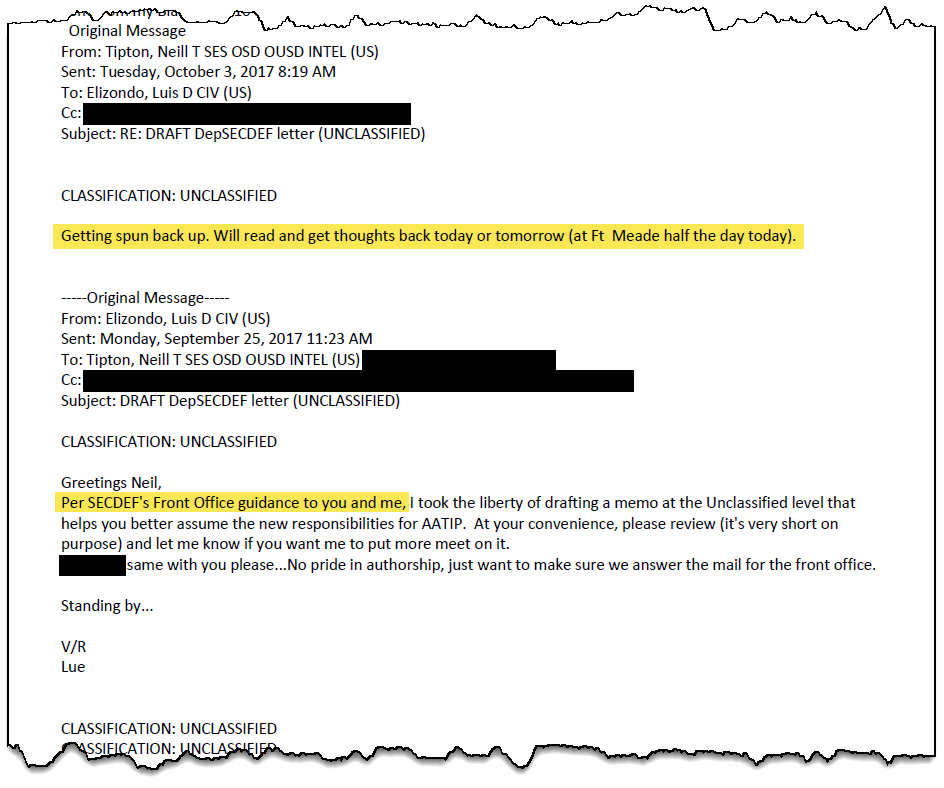
This was followed up by, “Why would the DoD tell me [this memo] didn’t exist, but I later would be successful getting it after an appeal from the same office that denied it existed in the first place?”
After publication of this article, Pentagon spokesperson Susan Gough submitted comment by stating, “As indicated in the response letter to you dated December 14, 2021, regarding 21-F-0964, the initial FOIA search did not yield responsive records.”
Given the opportunity to respond to the above, Elizondo added, “This response isn’t even worthy or a response. It’s clear that obfuscation and deceit is the new norm for the same few at the PAO office. I would once again remind them that propaganda and disinformation against the American public is illegal.”
Elizondo also provided the following written statement to the Black Vault about this release, which underscores his thoughts about the importance of it all:
“Thanks to The Black Vault’s continued pursuit of the facts, the DoD had no choice but to relent and admit the obvious. 1) AATIP was a real program and funded. 2) My former employer, the OUSD(I) has had, and currently has a keen interest in AATIP and the UAP topic. 3) There remains a clear national security nexus as it relates to UAP. My fear is that unless more people demand the truth, this information which many of us already knew, would never see the light of day and remain hidden from the public. An excellent example of The Black Vault not taking ‘no’ for an answer.”
As the controversy surrounding AATIP will undoubtedly continue, The Black Vault remains committed to bringing the truth to light, whatever that may be, despite the challenges posed by the DoD’s problematic FOIA process.
###
Document Archive
 21-FR-0964 FOIA Case File Release [4 Pages, 1.43MB]
21-FR-0964 FOIA Case File Release [4 Pages, 1.43MB]
 Loading...
Loading...Follow The Black Vault on Social Media:

